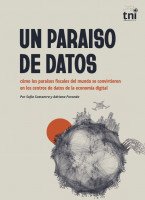But tax havens are becoming an even bigger problem for social equity as the global economy becomes more and more digital. Big Data, generated by all of us all over the world through our interactions with technology, is the raw material for the digital economy, but is processed only in a few countries and by a handful of companies.
Just as financial capital can be transferred across borders, which in turn has generated tax havens, so too is data stored in places where companies can exercise control. Tax havens are becoming data havens to hide away the raw material of the digital economy from states and communities, building digital monopolies that make fair competition impossible, and impede the improvement of digital products for the social good.
Our guest on the podcast argues that it is no coincidence that financial power and digital power are gradually using the same places to hide.
Sofia Scassera is an economist, and associate researcher at TNI working on issues of digital society and the digital economy. In this conversation, we discuss why data is an important raw material? Why is it important for data to be seen as a public good and not hidden away by corporations. Exactly why are tax havens becoming data havens? What is to be done?




